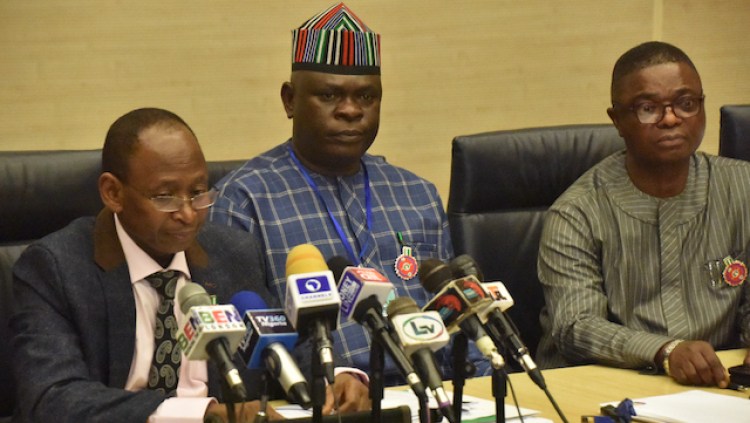Academic Staff Union of Universities (ASUU) has posed some tough questions to the Federal Government, asking why some federal agencies such as the Federal Inland Revenue Services, Central Bank of Nigeria and the Nigeria Deposit Insurance Corporation are not captured on the Integrated Payroll and Personnel Information System(IPPIS).
ASUU Chairman, University of Abuja branch, Dr. Kassim Umaru, raised the query while puncturing the insistence of the Federal Government that its members must enrol on the platform.
In a statement on Saturday, Umaru dismissed the payment system as a scam and said ASUU members will not join it.
The Office of Accountant-General of the Federation said that data of university workers and colleges of education be captured on the system between Monday November 25 and December 7.
Umaru said the National Executive Council of ASUU had a meeting and directed its members not to enrol, adding that the chapter will comply with the order from the national body.
Umaru argued that the payroll system is totally in violation of university autonomy and does not have any legal backing.
He faulted the government for resorting to threats whenever there was disagreement between the union and government.
Umaru urged the government to come to the table and discuss with the union instead of threatening to stop their salaries.
“As far as we are concerned in the union, we have worked and we must be paid. Eventually, if the government decides to stop our salary then the NEC will reconsider the decision of the government then appropriate action will be taken,”
“There is massive corruption in IPPIS. Did government care to investigate IPPIS itself? We are saying why is CBN not in IPPIS? Why is NDIC not in IPPIS? Why is Federal Inland Revenue not in IPPIS? But the lecturers who are just collecting stipends to be pulled into IPPIS so that our legal entitlement will not be paid.
“We are not going to allow it. We are not going to be part of the staff that are going to be enrolled in IPPIS. We took a resolution and we are reaffirming the direction of the national, that is NEC. NEC took a decision that we are not going to get enrolled into IPPIS and you know what our union is actually against is that the university has an autonomy and if you look at it clearly, this autonomy we are saying is enshrined in Section 2AA of the University Miscellaneous Provision Amendment Act of 2003 which clearly explained the role of the Governing Council.
“Even the Miscellaneous Act we are saying clearly stated that the power of the council shall be exercised as in the law and that status of each university. So it is clear we have an autonomy. Again, university is the peculiar nature of the appointment of university as academics. Our 2009 agreement which was negotiated by the federal government and our union is also there. So many issues are there and that is why our union is saying we should be allowed to produce a template which will have all these series of issues but not to have a center point of payment.”
Read Also: Stigmatisation Of People With HIV Fuelling Spread Of Virus
Aspects not captured by the IPPIS:
As submitted by Abubakar Sabo, ASUU Chair UDUS:
1. Provision for external examination for PhD and MSC students.
2. Provision for the payment of External assessment to which many would not have benefitted from and become professors.
3. Provision for casual staff such as those cleaners and gardeners that keep the university environment clean.
4. Provision for adjunct and part time lecturers who are professionals in their field but could not take full time appointment because they are already working elsewhere.
5. Provision for international experts who would want to come from world recognised universities to come and establish new programs in our universities and share their wealth of experience with us.
6. Provision for post graduate supervision which was completely removed from the platform
The fact of the matter is that the government is saying universities should use their IGR to cater for all these and should this become a reality, universities will be left with no option but to re introduce tuition fees and charge higher fees from the students. Then we will now know that an average Nigerian cannot afford higher education again. That is world bank policy for you. The general idea is to localise our universities and make them unaccessible globally all in the name of a policy for payments of salary.
NAN

